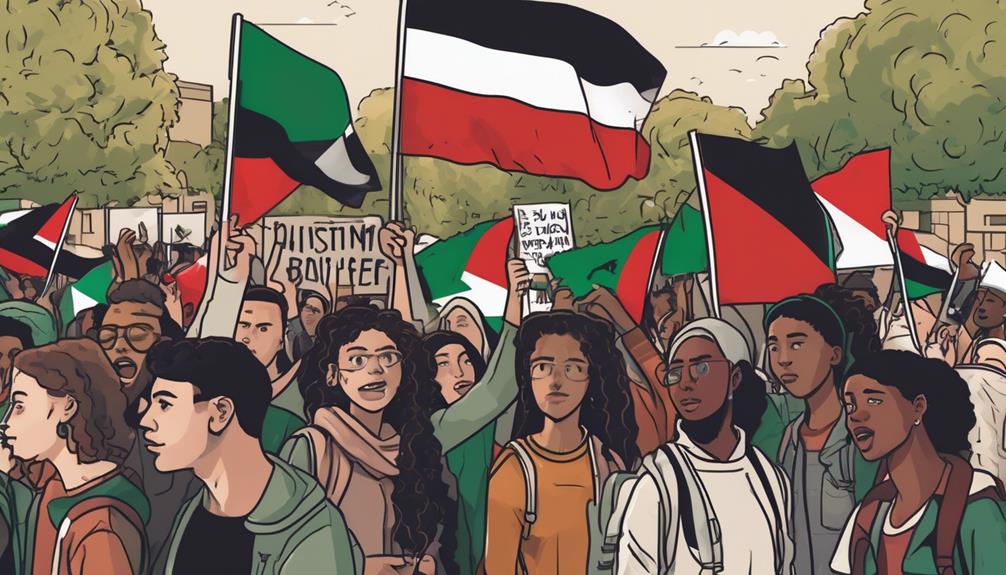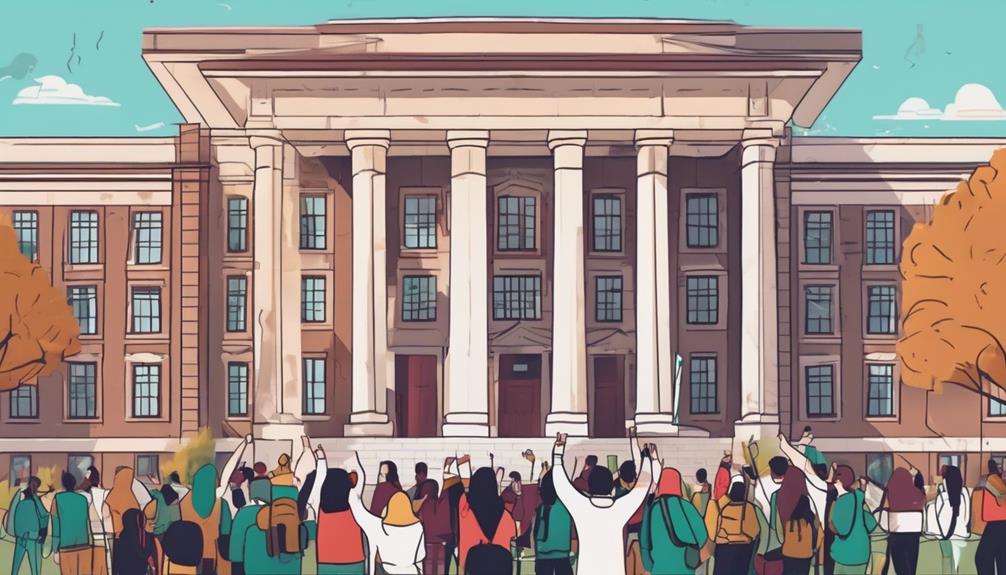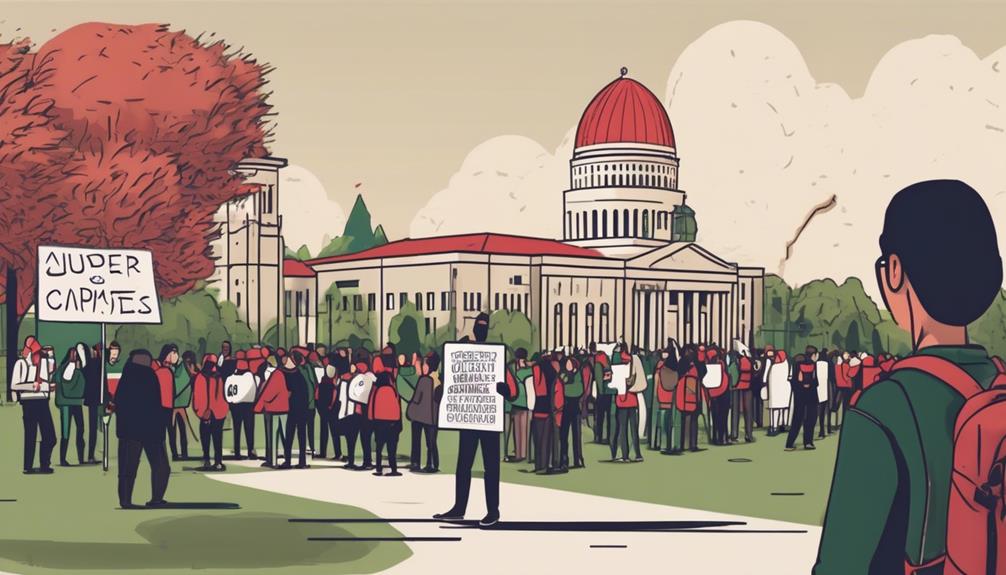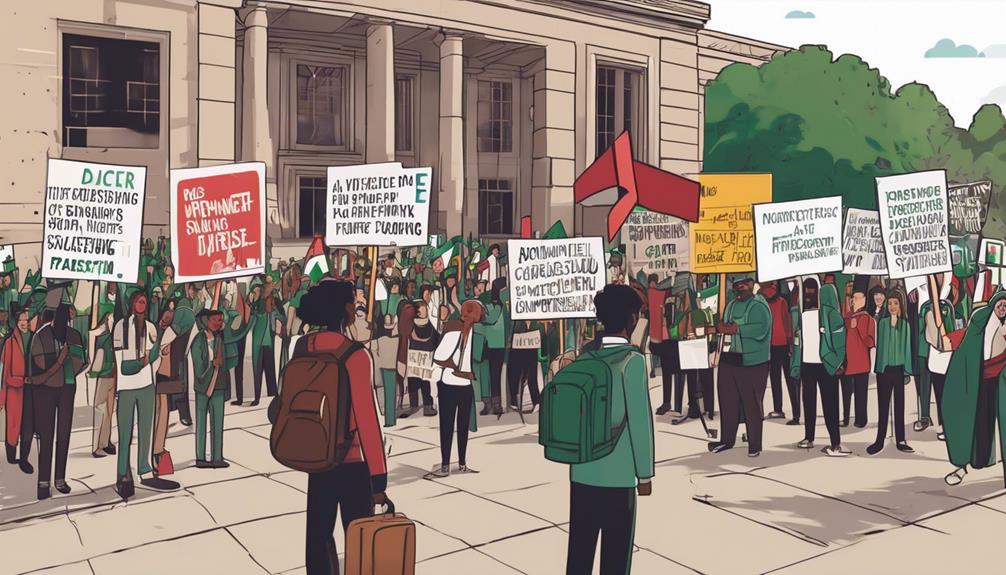As you contemplate the lawsuit filed by the UT student against the university regarding the handling of pro-Palestine protests, questions arise about the boundaries of free speech and campus regulations. The complexities of this case hint at broader implications for student activism, institutional responses, and the overall climate of inclusivity on campus. How will this legal challenge shape future discourse and policies within academic institutions, and what does it signify for the rights of students to voice their opinions in a university setting?
Background of Pro-Palestine Protests

During recent years, pro-Palestine protests on university campuses across the country have sparked debates on freedom of speech and political activism. These protests have served as a platform for students to express solidarity with the Palestinian cause, raising awareness about the ongoing conflicts in the region. Demonstrations, rallies, and educational events have been organized to shed light on the struggles faced by Palestinians and to advocate for their rights.
In some cases, these protests have faced backlash from individuals or groups who oppose the pro-Palestine movement, citing concerns about anti-Semitism or disruptions to campus activities. Despite these challenges, many students continue to participate in these protests, viewing them as a way to stand up for justice and human rights.
The university campuses have become battlegrounds for competing ideologies, with tensions running high as students engage in debates, dialogue, and sometimes confrontations over the issue. As a result, the line between free speech and hate speech has become increasingly blurred, leading to complex discussions about the limits of expression in academic settings.
Allegations Against the University
Amidst the backdrop of pro-Palestine protests on university campuses, allegations have surfaced against the institution regarding its handling of the student demonstrations. Concerns have been raised about the university's alleged lack of support for students expressing their views on the Palestinian-Israeli conflict. Some students claim that the university failed to protect their right to free speech and did not adequately address instances of harassment or intimidation during the protests. Additionally, there are accusations that the university showed bias in favor of certain groups involved in the demonstrations, leading to a perceived unequal treatment of students based on their political beliefs.
| Allegations Against the University |
|---|
| Lack of support for student free speech |
| Failure to address harassment and intimidation |
| Perceived bias in favor of specific groups |
Legal Basis of the Lawsuit

The student's lawsuit against the university is based on allegations of violations of their rights to free speech and fair treatment during the pro-Palestine protests.
The legal basis of the lawsuit includes:
- Violation of Free Speech Rights: The student claims that the university infringed upon their First Amendment right to freedom of speech by allegedly suppressing their expression of pro-Palestine views during the protests.
- Denial of Fair Treatment: The lawsuit contends that the university failed to provide fair and equal treatment to the student compared to other individuals or groups involved in the protests. This includes allegations of selective enforcement of policies and unequal disciplinary actions.
- Breach of Duty of Care: The student argues that the university breached its duty of care by not ensuring a safe and inclusive environment for all students during the protests, leading to the violation of their rights and potential harm.
Impact on Campus Community
The student's lawsuit against the university has generated significant conversations and reactions within the campus community. Some students may feel divided, with opinions ranging from support for the student's right to protest to concerns about the impact of such protests on campus life. This situation has sparked lively debates in classrooms, dormitories, and common areas, leading to a heightened awareness of the complexities surrounding free speech and activism on campus.
Faculty members have also been actively engaged in discussing the implications of the lawsuit, with some incorporating the case into their lectures to encourage critical thinking and dialogue among students.
The university administration has faced pressure from various student groups to address the issues raised by the lawsuit, highlighting the need for transparent communication and inclusive decision-making processes within the campus community.
Free Speech Vs. Campus Safety

Managing the balance between upholding free speech rights and ensuring campus safety poses a significant challenge for university administrations in light of the student's lawsuit over pro-Palestine protests.
- Conflicting Rights: Addressing the clash between the First Amendment right to free speech and the responsibility to maintain a safe and inclusive campus environment is a complex task.
- Security Measures: Implementing security protocols without infringing on individuals' freedom of expression demands a delicate approach to safeguarding both physical safety and the right to protest peacefully.
- Dialogue and Education: Fostering open dialogues and educational initiatives that promote understanding and respect for diverse perspectives can help mitigate tensions between free speech activities and campus safety concerns.
Finding a harmonious equilibrium between protecting the fundamental right to free speech and ensuring the safety and well-being of all members of the university community is pivotal in addressing the challenges arising from contentious protests and legal actions.
Public Reaction and Support
Public reaction and support for the student's lawsuit against the university over pro-Palestine protests has been overwhelmingly mixed.
Some individuals express solidarity with the student, emphasizing the importance of protecting free speech on campus. These supporters argue that universities should foster an environment where diverse opinions can be expressed without fear of retaliation.
On the other hand, there are those who believe that the university has a responsibility to maintain a safe and inclusive campus environment for all students. They contend that certain forms of protest, like the pro-Palestine demonstrations in question, may create a hostile atmosphere for some individuals. This group often emphasizes the need to balance free speech rights with considerations of campus safety and inclusivity.
As the lawsuit unfolds, the public remains divided on where the line should be drawn between protecting free speech and ensuring a secure campus environment.
Precedents in Campus Protest Cases

Examining past legal cases involving campus protests can provide valuable insights into how similar situations have been handled by the judicial system.
When it comes to campus protest cases, there are several notable precedents worth considering:
- Tinker v. Des Moines Independent Community School District (1969): In this landmark case, the Supreme Court ruled in favor of students' First Amendment rights to free speech, even within a school environment, as long as it doesn't disrupt the educational process.
- Doe v. University of Michigan (1989): This case highlighted the importance of universities maintaining a balance between allowing freedom of expression and ensuring a safe and inclusive campus environment for all students.
- Morrison v. Board of Education of Boyd County (2002): The outcome of this case emphasized the need for universities to establish clear guidelines and policies regarding protests to prevent potential legal disputes and uphold the protection of students' constitutional rights.
Future Implications and Resolutions
What potential consequences might arise from the ongoing campus protests and what steps can be taken to address them effectively?
The continued escalation of tensions surrounding the pro-Palestine protests could lead to further polarization among students, faculty, and the community. This division may hinder constructive dialogue and create a hostile environment on campus.
To address these challenges effectively, both the university administration and student organizations must prioritize open communication and respectful engagement. Implementing mediation sessions or facilitated discussions can provide a platform for all parties to express their perspectives and concerns in a constructive manner.
Additionally, establishing clear guidelines for peaceful demonstrations and fostering a culture of mutual respect can help prevent future conflicts. It's essential for all stakeholders to work together to find common ground and promote a campus environment that values diversity, inclusivity, and understanding.
Conclusion
As you reflect on the lawsuit against UT, consider the importance of safeguarding free speech rights while maintaining a safe campus environment.
The outcome of this case will shape how universities address contentious issues and guarantee fair treatment for all student groups.
Let's continue to advocate for open dialogue, transparent policies, and respect for diverse perspectives on college campuses.